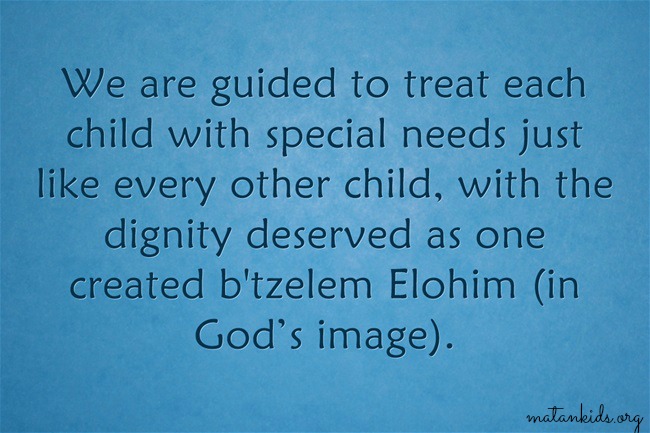In recognition of Jewish Disabilities Awareness Month, Rabbi Paul Kipnes is the second contributor to our weekly D’var Torah (word of Torah) where guest bloggers will link the week’s Torah portion to the theme of inclusion.
 The chiddush, that elusive new piece of wisdom to bring insight, comes from our Rabbinic Intern Dusty Klass who discovered, with the help of HUC-JIR’s Rabbi Dvora Weisberg, two kinds of laws in Mishpatim:
The chiddush, that elusive new piece of wisdom to bring insight, comes from our Rabbinic Intern Dusty Klass who discovered, with the help of HUC-JIR’s Rabbi Dvora Weisberg, two kinds of laws in Mishpatim:
The first are characterized by their “when X, then Y” structure: When a fire is started and spreads too far, then the one who started the fire must make restitution (Exodus 22:5). When you happen upon your enemy’s donkey wandering around, then you must take it back (Exodus 23:4). These laws, encompassing most of Mishpatim, present the proper way to react when something occurs.
The second are more directive: You shall not wrong or oppress a stranger… (Exodus 22:20). You shall neither side with the mighty to do wrong…nor shall you show deference to a poor person in a dispute (Exodus 23:2-3). These laws are not case-specific. We are not told: “when you see a stranger, you must not wrong her.” Rather, we are told to “do this” or “don’t do that” to propel us to act in pursuit of higher principles. Forming the bedrock of Judaism’s beloved ethical laws, these laws goad us toward values-based living.
Mishpatim teaches that certain principles transcend individual cases, but also that certain cases cause us to respond to specific occurrences in life. How relevant it seemed as I thought about 12-year-old Alex.
Why Alex has full “walk in” privileges to my office:
At Congregation Or Ami (Calabasas, CA), Alex just walks right in and no one, including me, blinks. Why? Because Alex was diagnosed with fetal alcohol spectrum disorder and with significant social, behavioral and learning challenges. Alex has such a love of Judaism that his exuberance sometimes cannot manage social expectations. He loves his synagogue, so even when he walks up on the bimah during services, we just smile and give him a hug.
Alex is learning Hebrew with master teacher Patti Jo Wolfson. No one — including his adoptive parents who invest so much energy — thought Alex could ever learn to read Hebrew, let alone become a bar mitzvah. But Or Ami is committed to the principle that any child of a member who works to the best of his or her ability is entitled to a Jewish learning experience and to become bar/bat mitzvah. Reminiscent of the first type of laws, this principle guides us to treat each child with special needs just like every other child, with the dignity deserved as one created b’tzelem Elohim (in God’s image).
When … Then: Crafting a Bar Mitzvah Plan for Alex
Still, we have to deal with Alex’s specific needs. Alex’s patient master teacher was thinking ahead to Alex’s bar mitzvah preparation. Does he go into the congregation’s Bar Mitzvah Boot Camp program and then on to our regular bar mitzvah tutoring? Will it work for him?
Alex’s mom, Joeli, explained that Alex is learning Hebrew only because we discovered, in Miss Patti, the key to unlock Alex’s ability to learn. Here the second type of laws, the “when … then,” guide us. When because of Miss Patti, Alex learns what he hasn’t learned before, then we should build his bar mitzvah preparation process around that learning relationship. Reacting to the special case of this unique kid, we respond by embracing his unique path… and changing our process.
A Special Torah Portion for an Especially Awesome Kid
Incidentally, Alex’s Torah portion is Deuteronomy’s V’ahavta, which he learns first to sing as a prayer, and then will rediscover in the Torah. V’shinantam livanecha (Deuteronomy 6:7 — “You shall teach it to your children”) has the quality of repetition. We repeatedly teach Alex this stunning piece of Torah so he can repeatedly remind us of our responsibilities.
That’s the chiddush — our responsibility to be embracing of another of God’s cherished children. Funny, at first Dusty thought this teaching was too simplistic. But not everyone realizes that children with special needs deserve the full embrace of synagogues. So we must teach it again and again.
 Rabbi Paul Kipnes, spiritual leader of Congregation Or Ami in Calabasas, was honored by the Los Angeles Dodgers for his commitment to Disability Inclusion. His recollections about his Grandmother Esther’s bout with Alzheimer’s are published in “Broken Fragments” (URJPress, 2012). He and his wife, Michelle November, are writing a book on Jewish spiritual parenting. He blogs at rabbipaul.blogspot.com and tweets @RabbiKip.
Rabbi Paul Kipnes, spiritual leader of Congregation Or Ami in Calabasas, was honored by the Los Angeles Dodgers for his commitment to Disability Inclusion. His recollections about his Grandmother Esther’s bout with Alzheimer’s are published in “Broken Fragments” (URJPress, 2012). He and his wife, Michelle November, are writing a book on Jewish spiritual parenting. He blogs at rabbipaul.blogspot.com and tweets @RabbiKip.
